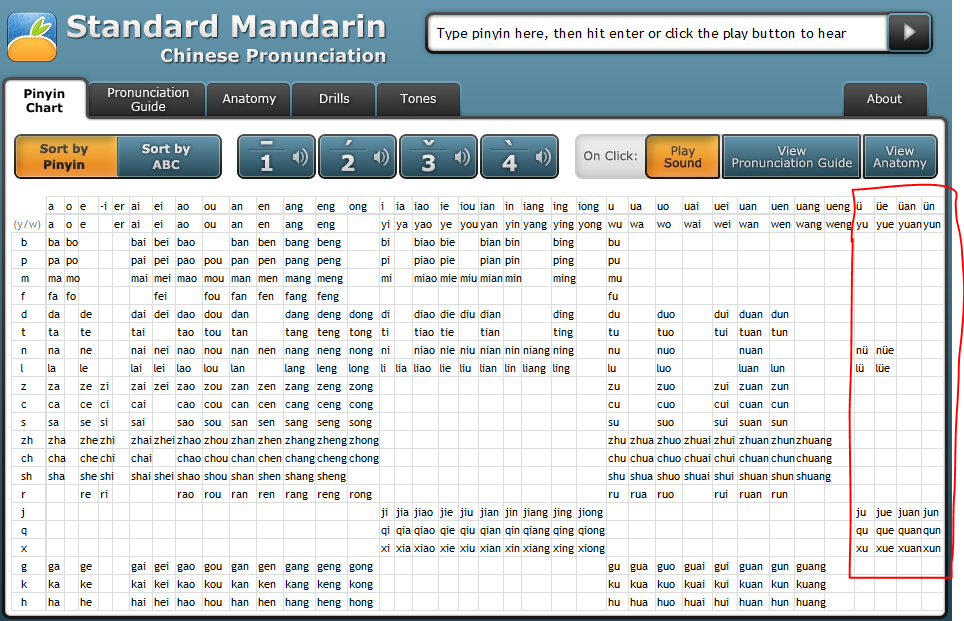My mothertongue teacher suggested the following "Pinyin false friends list". She spoke about the "7+3+5" false friends:
- The 7 are
z c s zh ch sh r, after which i is pronounced, she said, as "silence"; this, as I said in a comment, equates to either always /ɨ/ or, more accurately, a trailing syllabic voiced fricative, i.e. zi ci si zhi chi shi ri = /tsz̩ tsʰz̩ sz̩ tʂʐ̩ tʂʰʐ̩ ʂʐ̩ ɻʐ̩/, or one may say ri = /ʐʐ̩/, that varies from speaker to speaker;
- The 3 are
j q x, after which u is pronounced like ü in any case; that is because j q x are alveolo-palatal, and are thus never used before non-palatal sounds like u; that also explains why z c s zh ch sh r have the above sounds with -i: i is palatal, they are not; in fact, what used to be */tsi/ etc. "collapsed" into modern ji etc., and so did *gi etc, according to Wikipedia; this is why Peking is Beijing: it used to be *Beiging and got Wade-Giles Pei-king, and lost the i for "English phonetic representation";
- The 5 are
ui iu ian üan o, which are pronounced as uei iou ien üen we respectively.
Now I do not agree to the o. Or rather, it needs specifications. o by itself is, AFAIK, only present in the 4 characters 哦喔噢嚄, which are interjections and exclamative particles, and which I would pronounce /o/ – I'm not a native though, so this must be taken cum grano salis, and they are sometimes rendered as /wo/. When o is a syllable final (e.g. bo po mo fo, actually those are the only examples, as elsewhere you find uo) it is usually pronounced /wo/. Wikipedia has this table and note three in this one agreeing with this view. Also, this Wiktionary entry, for example, translates -o to /-u̯o/, which is essentially /-wo/. With this, I think the 7+3+5 rule is a good mnemonic for these spelling-sound discrepancies.
See also here for further reading and comparisons with other Romanizations such as Wade-Giles.
There is also another thing: tone sandhi (Chinese 连续变调). Basically, third tones often change. Base rule: 3+3 -> 2+3, i.e. nǐhǎo is pronounced níhǎo. For sequences, see here and linked questions. There are also tone variations of 一 and 不, which are sometimes marked, but often not marked. For those, if you are not satisfied with this, I suggest you ask another question.

-uiand-iu, which are spelt-ueiand-iouin it, and forübeing a totally different letter fromu. However, marking tone 1 with nothing and tone 0 with a dot is something I don't like. Also, the-iancombination is spelt that way, but is pronounced/jen/. And I guess spellingsongassuengandqiongasqüengis not that much an advantage or a clear spelling. So for people who already know the Latin alphabet, I'd definitely recommend Pinyin, whereas for those who don't, well, each has its pros and cons :).